Women’s education and CAI programming: What does the future hold?
Updated December 9, 2021
In the past several months, many of you have contacted us to ask pressing questions. What’s the latest news from Afghanistan? What is the situation regarding Afghan girls’ education and Afghan women’s right to work? How have recent events impacted schools and students supported by Central Asia Institute? Will Central Asia Institute continue to work in Afghanistan?
Below we tackle these questions – and also share what Central Asia Institute is doing to help thanks to your caring and support.
We are deeply grateful for all who have expressed your concerns and/or donated to support CAI’s efforts in Afghanistan. Your generosity, words of encouragement, and support bolster our spirits and reassure our Afghan friends that they’re not alone in this dark time.
What is the current situation in Afghanistan?
Four months since the Taliban took control of Afghanistan, its people continue to face a precarious future. When the U.S. evacuated in mid-August, the humanitarian situation was already serious due to the compounding impacts of conflict, the persistence of COVID-19, and a second year of severe drought.
Alarmingly, the situation has only worsened since then. Hundreds of thousands of people displaced during 2021 are facing dire conditions as winter sets in. The economy – which was almost entirely dependent on foreign aid – is in crisis pushing the majority of the population below the poverty line. Government employees including the police, healthcare workers, and teachers, have not been paid and in many places, basic services like healthcare and education are unavailable. As winter sets in, more than 22 million people are struggling to put food on their tables and an estimated 3.2 million children face life-threatening, acute malnutrition.
To address this, donor countries have pledged over a billion dollars in humanitarian aid, and the United Nations and international aid groups are scrambling to deliver emergency humanitarian assistance. To avoid catastrophe and save lives, the Taliban and the international community will need to work together with the best interests of millions of innocent people in mind.
What is CAI doing to help?
CAI has been working closely with its local partners to address the greatest needs of the Afghan people. In November, we launched a project to assist displaced women, men, and children who fled with few, if any, belongings and are living in makeshift shelters in informal displacement sites as winter conditions set in. Three hundred vulnerable families were identified and provided with key essentials including mats, blankets, cooking utensils, and books, pencils, and toys for their children.
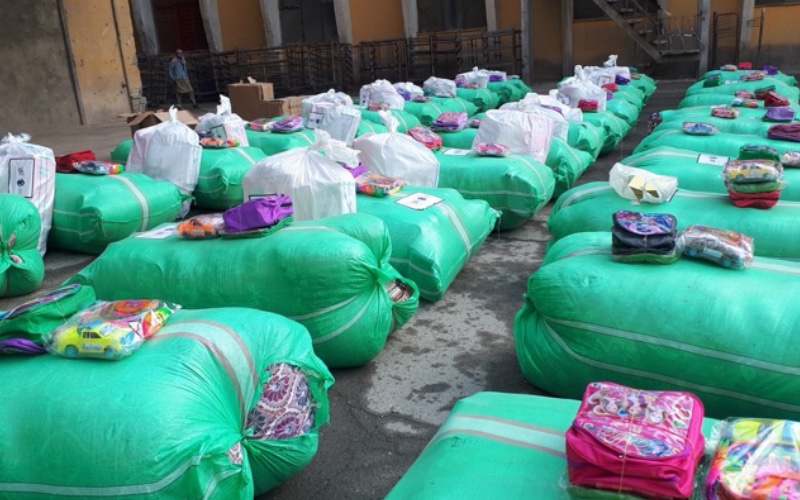
Emergency aid kits – including blankets, mattresses, backpacks, toys, and books – ready for distribution.
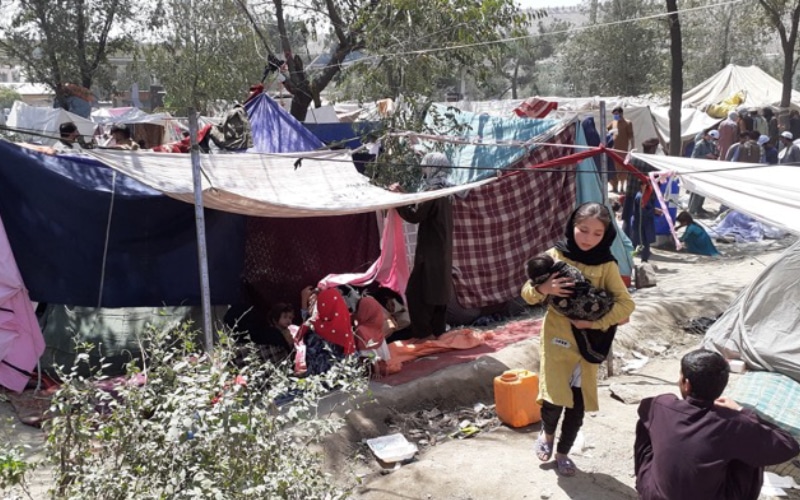
Displaced young girl and baby who are living in a camp for displaced people.
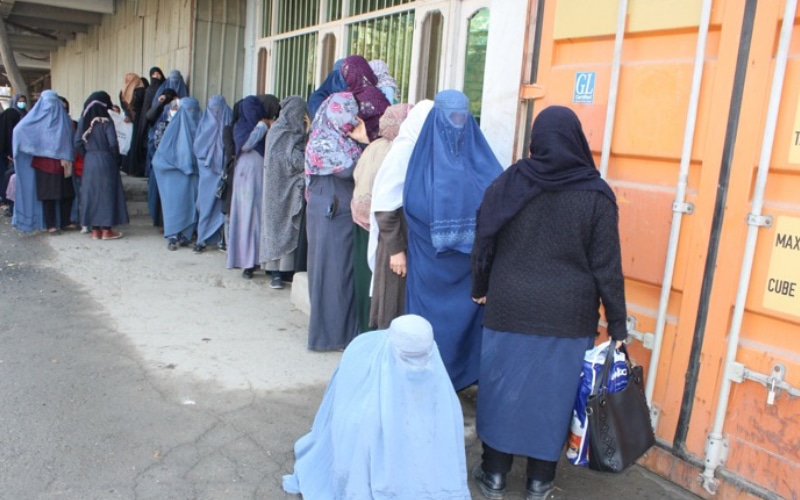
Women and children waiting in line to receive an emergency aid kit.
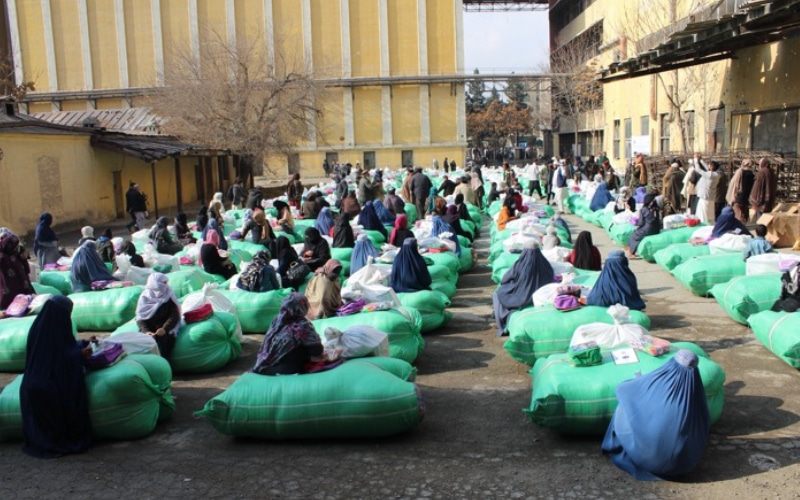
Families claiming their emergency aid kits provided by Central Asia Institute.
Over the winter months, our support will continue to target the most vulnerable people including children, people with disabilities, and pregnant and lactating women. An additional 360 households (approximately 2,500 people) will receive winterization assistance including fuel to heat their homes, winter clothing, and blankets.
What’s the latest news regarding girls’ education and a woman’s right to work?
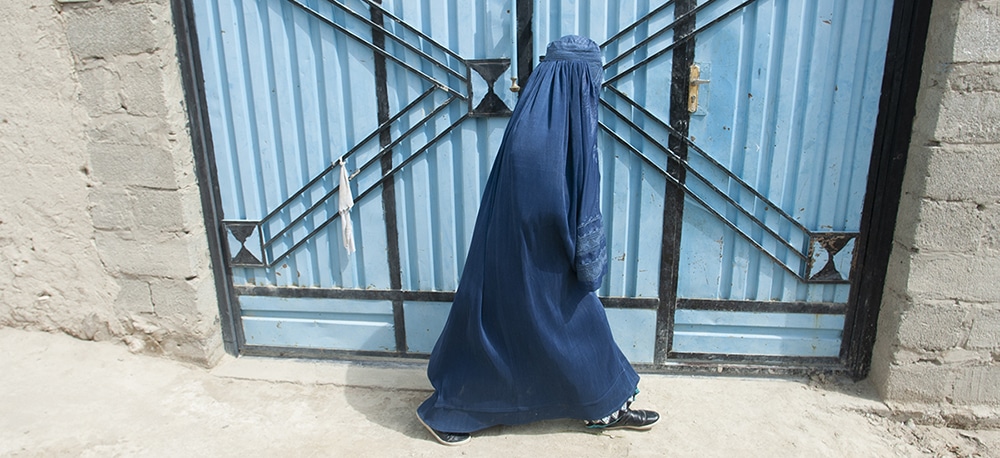
Taliban leadership is allowing girls to attend primary school. Older girls, however, are not so fortunate. In September, the Taliban stated that boys could return to secondary school (6th grade and up) but girls must stay home until certain conditions for girls’ education could be worked out. Since then, the spokesman for the Taliban has reiterated that the new government supports girls’ education and will provide opportunities for girls and women to work and go to school. But the Taliban leadership has yet to announce when and under what conditions older girls will be allowed to return to middle and high school saying only that their religious scholars “are working on it.”
In the meantime, limitations have already been placed on female students – including that they must be educated separately from boys and taught by a female teacher. Given the country’s lack of all-female schools and female secondary school teachers, these restrictions threaten to put school out of reach for many Afghan girls.
Universities opened on September 5th. Women in some regions have been allowed to attend as long as they comply with gender-based education restrictions. In addition, women attending university are being forced to adhere to strict dress codes – they must wear burqas or long, black abayas that cover their entire bodies, gloves to cover their hands, and a niqab over their faces, leaving just their eyes uncovered. In some regions, there are reports that women are being turned away from university altogether. Others have been told they cannot take certain classes, like engineering, government studies, or courses that would lead to a career path “unsuitable for women.” Unfortunately, it looks like even restricted access to education may become unavailable to women moving forward. On September 28, the new Chancellor for Kabul University announced that women would be banned from the institution either as instructors or students. Many women fear that it is only a matter of time before the Taliban completely bar them from education.
How have recent events impacted schools and students supported by Central Asia Institute?
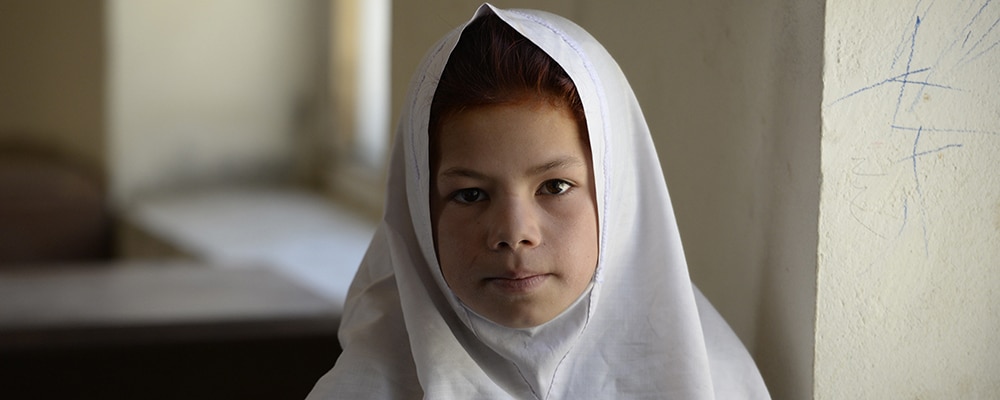
Our education programs for pre-school and primary school-aged children, including community-based education, wound up in November. At present, Central Asia Institute’s education projects are on hold while we work to ensure that procedures are in place to address risks and challenges that have arisen under the new Taliban regime. In the meantime, we will continue to provide humanitarian assistance targeting the most vulnerable, especially children and women. With pressure building both on the Taliban to allow all girls to attend school and women to work, and on donor governments to ensure that restrictions on assistance don’t end up further harming women and girls, we remain hopeful that access to education for all Afghans will improve in the coming months.
Will Central Asia Institute continue to work in Afghanistan?
Right now, the greatest concern is the humanitarian situation as described above. CAI and our partners are working hard to meet the most urgent needs of the Afghan communities we’ve long served. We’re fortunate to work directly through local Afghan partners, who can tell us what they’re seeing and hearing as conditions on the ground change. These organizations have a history of working in districts under Taliban control and have experience safely and effectively delivering humanitarian and development assistance. With their guidance and support, we will continue to do all we can to address the needs of those who have been impacted by this crisis.
Although our programs may require modification, or stop and start, we’re committed to standing with our Afghan sisters and brothers for as long as we’re able. Their bravery and determination to fight for a better future for themselves and their children motivate and inspire us daily.
Have other questions we didn’t address?
CAI is committed to keeping our supporters informed about the evolving situation on the ground and how we are responding, and we welcome your inquiries! To dive deeper, please connect with us via email at info@centralasiainstitute.org or phone at 406.585.7841. We look forward to speaking with you.
Resources: How to help Afghans
*Reference in this site is for the information and convenience of the public, and does not constitute endorsement, recommendation, or favoring by Central Asia Institute.

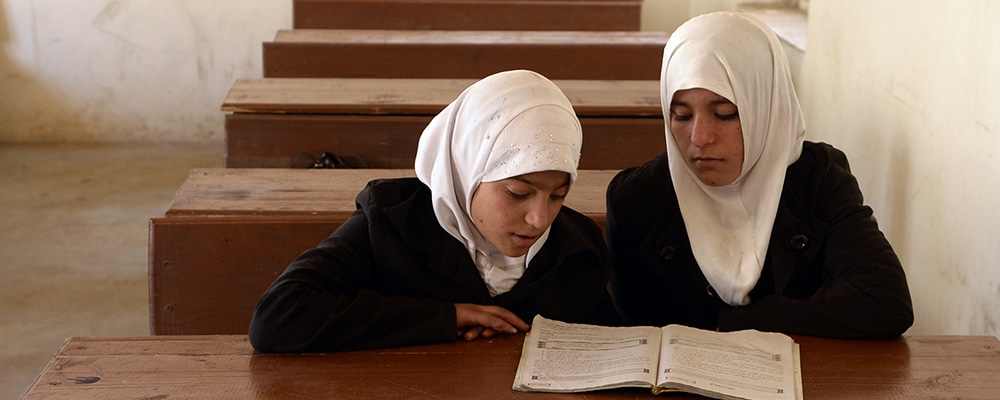





28 responses to “Women’s education and CAI programming: What does the future hold?”
Thank you so much for your update. It is so incredibly sad to see this chaos.
You’re so welcome, Cammy. Thank you for reading and for continuing to support CAI and our Afghan friends.
How can you transfer funds to CAI-supported schools in Afghanistan with the banking system essentially closed to the outside world?
Andrew and Margrit, great question. Our partners had withdrawn a certain amount of cash before the banking system was frozen. In addition, banks are allowing non-profit organizations that are delivering humanitarian programs to withdraw 20% of funds per week. With these funds, we have been able to continue a few programs. Others are on hold until the banking issue is resolved. There is a lot of outside pressure on the US and IMF to resolve the issue to allow humanitarian funds to flow into the country to address the looming humanitarian crisis. Please let us know if you have any other questions. We’d be happy to answer them.
Thank you for this update. The focus on community schools and support for families in need sounds appropriate for the current status. The Taliban rules on women’s work and higher ed is disheartening. They are hurting their own country, sadly. I will continue to support CAI and look to you for updates. Stay strong! Judy in Baltimore, MD
Judy, you’re very welcome. Thank YOU for your kind words and continued support. So lovely to see that you’re a Marylander, as well!
Thank you for this update. It saddens me so deeply to see what is going on in Afghanistan and I am glad CAI is there to hold the line as much as possible. What is happening with the women’s centers? What is your greatest need from supporters? Thank you for all you are doing in these very confusing times.
Thank you, Londa. We appreciate you holding the line with us. To answer your question, currently, all of our educational and vocational programs for Afghan women are on hold. We hope that we’ll be able to restart them, but we’re concerned about the increasingly strict restrictions being placed on women by the Taliban. We are in touch with our Afghan partners and together we are looking for innovative ways to advance education and help with the most urgent needs on the ground. Things are changing rapidly and our programs may stop and start. In situations like this, we are especially grateful for monthly contributions. Monthly gifts allow us to plan for the future and adapt quickly. But we are so grateful for any and all support. Knowing that kindhearted people like you are standing with us, keeps our spirits high. Thank you!
Unfortunate but predictable given past history. CAI has accomplished so much, and that will continue, even though restricted. The Taliban can never take away from girls and women what they have learned in the past.
So true, Shirley! The knowledge people have gained over the years can never be taken away. And the Afghan people are determined to continue learning. We’ll be there to help them as long as we can!
God bless y’all for the important work you’re doing! How many CAI members are currently in Afghanistan working on various projects? If there are CAI working there, are they in danger of Taliban violence, or does the Taliban value the humanitarian work the CAI is doing? What ways can the CAI find common ground with the current leadership to help ease the pressure on humanitarian aid? Lastly, is there anything we can collectively do to help encourage more women to be able to experience higher education in central Asia? It’s seems like the facts are well established that empowered and educated women lead to better quality of life for themselves and there communities. I’m confused and troubled why the Taliban would prevent women from becoming all they can be. Thank you again for your powerful mission, following in the courageous foot steps of Greg and others, serving this oppressed area of the world!! You are all playing such an important role, and a personal source of inspiration for me and my family!
Thank you so much, Wes. We’re so grateful for everything that you do to support us and our friends overseas. Let me try to answer your questions here, but please feel free to give us a ring if you would like to discuss anything further. We work with several Afghan NGOs and yes they are very much at risk. Taliban leadership has been slowly increasing the restrictions on girls’ education and women’s rights to work. However, in some regions, Taliban officials have encouraged CAI’s partners to continue certain programs. We’re fortunate to work directly through local Afghan partners, who can tell us what they’re seeing and hearing as conditions on the ground change. These organizations have a history of working in districts under Taliban control and have experience safely and effectively delivering education and other forms of assistance. With their guidance and support, we will continue to do all we can to address the needs of those who have been impacted by this crisis. As for the benefits of education, you are absolutely right. Like you, we find it baffling that the Taliban don’t want to educate half of the country’s population. I’d encourage you to write to your representatives and let them know that this issue is important to you. If we can work on this issue from the top by keeping our government engaged, and from the bottom, with the work that CAI’s partners are doing on the ground, I’m hopeful that women and girls will find a way to access education and thrive. Thank YOU for being such an important source of inspiration for us and our Afghan friends!
Thank you for the update and for persevering in an incredibly difficult and dire situation! We are with you!
Thank you, Claire. That means the world to us! As anthropologist Margaret Mead said, “Never doubt that a small group of thoughtful committed individuals can change the world. In fact, it’s the only thing that ever has.”
Thank you so much for the update. It’s hard to believe this is happening. I’m willing to continue my support to CAI to provide education & community projects to the Afghans.
Thank you so much, Donna. Your support is greatly appreciated. I’m so glad you found the update helpful. We’ll do our best to keep them coming.
With so many young people in Afghanistan, would be great to see them revolt against the stupidity of the Taliban and reinforce giving strength to females of this country–maybe even distributing pepper spray so that females donn’t have to just stay home and do nothing about what’s going on–but am sure you folks know more about what’s happening than I do.
Jeannie, I totally understand where you are coming from! I think a lot of Afghans feel the same way. We’re seeing protests happening across the country and women speaking out against the restrictions being placed on them. We must hope the voices for peace and equality win out over those for violence and oppression.
Is there any prospect that CAI will be able to help coordinate the resettlement in the Bozeman area of some Afghan families who are coming to Montana in the months ahead? These folks are not dealt with in the same way that other refugees are; i.e., officially designated non-profit resettlement agencies such as the International Rescue Committee in Missoula are not permitted to provide the same levels of financial support to holders of Special Immigrant Visas or assigned the status of humanitarian entries. I am aware of an effort in Helena to fundraise and find housing for some Afghans. Notwithstanding the dearth of affordable housing in our community, I think a combined effort of CAI and Gallatin Refugee Connections and others might be able to cobble something together and take some pressure off the Missoula folks. Any thoughts?
Stephen, currently we’re focused on helping folks still in Afghanistan. However, I know that our programs team has discussed the possibility of helping refugees, as well. I believe the discussions were more about helping refugees fleeing to nearby countries in the region, but let me follow up with our programs team to see if they have any more information for you. On a personal note, being based out of Montana, I know that our staff wants to do everything possible to help with resettlement efforts.
I have long supported the CAI mission in Afghanistan. It is horrible to see what the Talib is doing now. God bless you for all the good you have done there and the girls and women you have helped.
Thank you, Margie. We’re only able to do the work that we do because of the generosity and kindness of folks like you. Thank you for standing with us!
There are at least two items which make CAI viable in this region. First, CAI does not enter a country or region and simply set up shop. The locals must ask for help and participate in the program…from building schools to staffing them. Second, remember that CAI works in other countries that are neighbors to Afghanistan and so when the time is right they will be able to continue the vital work of educating girls and women. One question I have is if Admiral Mike Mullan and his wife could be of some assistance to CAI. I recall it was Admiral Mullan and his wife that celebrated schools opening by participating in ribbon cutting ceremonies in Afghanistan. This type of support is critical and I believe Admiral Mullan realized the long term view of CAI is what will win the day.
Dear Joe,
You make some excellent points. We feel so fortunate to work with local organizations throughout the region and to have wonderful relationships with the communities that we serve. At the end of the day, we’re just helping the people of Afghanistan realize their dreams. And they are still dreaming of education. To your other point, I’m not sure if Admiral Mullen and Mrs. Mullen would be interested in assisting CAI, but I will mention it to our team. Thank you very much for the suggestion!
I really appreciate the work that you do and I share your updates. We cannot allow this situation to go unnoticed or ignored as it already has. The outrage can’t fade.
Carol, thank you for helping to get the word out! Our Afghan friends are counting on us.
Tis indeed a sad day for all women and girls after so much progress had been made life is so uncertain
In these troubled times my heart goes out to you all,
Thank you so much. It is a sad time, but there is still hope. Kindhearted people like you keep that hope alive. Thank you for your support!